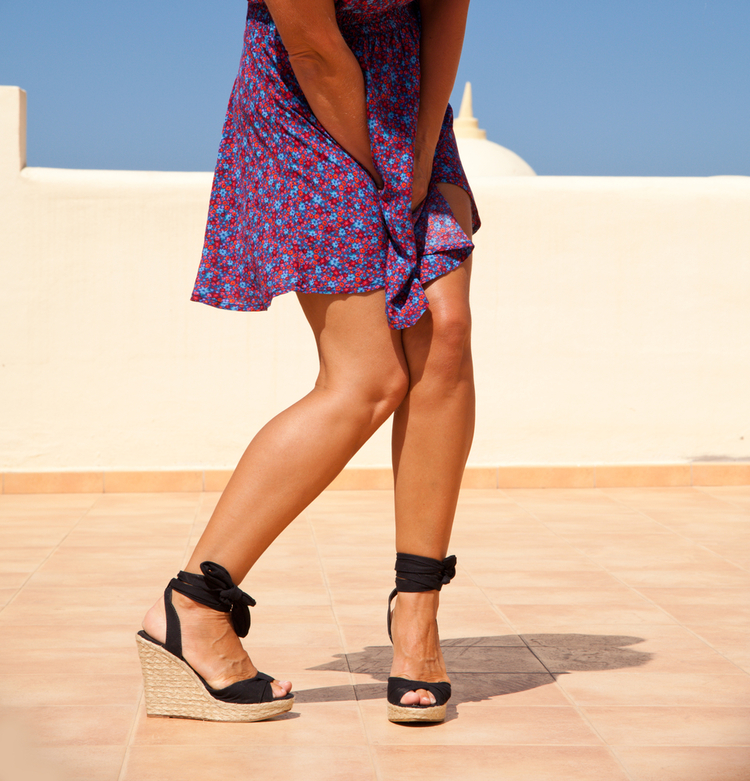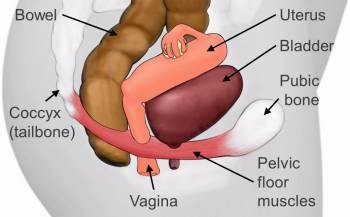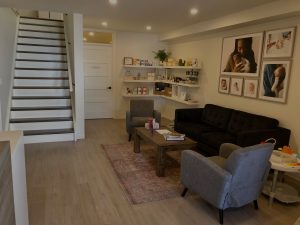 As a Pelvic Health Physiotherapist at the WOMB, I work primarily with women during and after their pregnancies to help decrease back, hip and pelvic pain, treat incontinence (bladder or bowel leaking), prevent pelvic organ prolapse (uterus, bladder or bowel moving into the vaginal canal) or sexual dysfunction like dyspareunia (pain with intercourse). I cannot tell you how many times clients have said to me, “well, my Mom/Aunt/sister has had two/three/thirteen kids and also has leaking/pain so I thought this was normal”. A phrase I use all the time is ‘it is common, but not normal’.
As a Pelvic Health Physiotherapist at the WOMB, I work primarily with women during and after their pregnancies to help decrease back, hip and pelvic pain, treat incontinence (bladder or bowel leaking), prevent pelvic organ prolapse (uterus, bladder or bowel moving into the vaginal canal) or sexual dysfunction like dyspareunia (pain with intercourse). I cannot tell you how many times clients have said to me, “well, my Mom/Aunt/sister has had two/three/thirteen kids and also has leaking/pain so I thought this was normal”. A phrase I use all the time is ‘it is common, but not normal’.
It is NOT normal to have leaking when you laugh, cough, sneeze or jump
It is NOT normal to have to run to the bathroom because you get the sudden urge to go NOW
It is NOT normal to wake up at night to pee until after menopause, at which time only 1x/night is expected
It is NOT normal to feel like something is falling out or pushing down on your vagina at the end of the day or with activity (or at any time!)
It is NOT normal to have pain with sexual activity (unless, of course, you choose to incorporate pain into your sexual activity in which case this is normal for you)

These statements ring true regardless of how many children you have had and what your age is. Why? Because all of these activities have to do with your pelvic floor and inner core functioning. Your pelvic floor is a series of muscles, and muscles can be trained at any age and any stage of life. They work to support your organs, keep your back and hips moving well, stop you from leaking and react during sexual activity.
Fortunately pre and post natal Pelvic Health Physio is growing in popularity – MDs/OBGYNs/midwives are starting to refer clients who have symptoms and the public is more aware of their options for optimizing their health both preventively and when treating any issues. But I feel a gap is being missed when it comes to the Mother’s Mother.
Grandma’s have vaginas too and they have been through a lot!
Unfortunately, women tend to believe that leaking/pain/falling out feelings are normal after kids or as they age and often don’t report their symptoms to their doctor. That’s because Pelvic Health Physio is relatively new to healthcare (compared to say dentists, which have been around since we realized we could pull teeth out when they hurt). Leaking, pain and pressure symptoms can really impact someone’s quality of life – not wanting to do certain activities in case you have an accident, not wear certain clothes in case the pad shows, not feeling sexually attractive because it hurts to have sex, or what if there is a leak!? If they do report it to their doctor, it used to be that surgery was the golden ticket, however pelvic surgeries haven’t been as successful as anticipated and can have some really unpleasant side effects.

Fortunately, as I mentioned before, all of these symptoms have to do with pelvic floor muscle functioning, and muscles can be trained! Pelvic floor physio is advised as first line treatment (so BEFORE surgery) for urinary incontinence (Journal of OBGYNs Canada Guidelines) and as successful conservative management of pelvic prolapse (Cochrane review 2011). Just like the more squats you do the easier it is to get out of a chair, or the more your practice the piano the easier it is to perform more complex pieces, the more strengthening and coordination exercises you do for your pelvic floor the easier it’ll be to perform – whether this be by holding in pee, supporting your organs as you lift or having pain free sex. My job as a Pelvic Health Physio is to teach you how to do these exercises and incorporate them into your day-to-day activities.
Yes, vaginal tissues change as we age. Decreased estrogen during and after menopause thins and dries vaginal tissues. This can contribute to or worsen any leaking/pain/falling out symptoms you may have. Topical estrogen from your doctor and/or natural vaginal moisturizers (ie Mae by Damiva) can help to reduce these symptoms. Combine this with Pelvic Floor Physio to ensure your muscles are strong, flexible and coordinated, and we have a pretty great anti-aging system for your vagina!
Checking in with your Pelvic Floor Physiotherapist around when you have kids is great – we can help your body through it’s natural changes and ‘nip’ any problems ‘in the bud’. But it’s never too late to discover how to help your body help itself, whether you are post menopausal, have already had a pelvic surgery, have had no kids or 7 kids. If you are reading this as a new mom, don’t forget about your Mom/Aunt/sister who mentioned they had pain/leaking/falling out issues too. Feel free to send them this link or reach out to me personally if you have any questions.

Jenny Telfer Crum is a Pelvic Health Physiotherapist at The WOMB specializing in return to exercise and normal function after birth. Jenny holds an Honours Bachelor of Science degree in Human Kinetics from the University of Guelph and a Masters of Science in Physiotherapy from McMaster University. She became interested in Pelvic Health after experiencing chronic hip pain that did not resolve through traditional orthopedic physiotherapy treatment but resolved quickly after seeing a Pelvic Health Physiotherapist. Set up your pelvic health physiotherapy appointment today!





